Hey Junkies!
Want to learn to talk Japanese?
Master some simple Japanese conversation? Good.
Today, you will master 10 simple Japanese conversations that you can break down and learn new phrases from! They are easy.
In fact, if you print this page and re-read (out loud) it every now and then, they’ll get stuck in your brain for good.
In this easy conversation lesson, you’ll learn some:
- how to introduce yourself in Japanese
- ask if someone’s free to hang out
- ask for someone’s age
- check if someone speaks English
- ask for directions
- and more!
Yes! You’ll also get translations and explanations for each one.
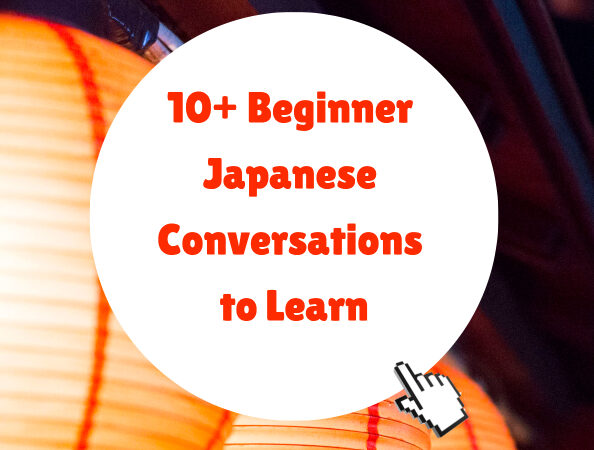
Also…
Japanese conversation Audio
If you want to learn Japanese conversation AND LISTEN to the pronunciation, play this audio lesson below.
- Title: Say Hello in Japanese No Matter the Time of Day
- Lesson by JapanesePod101.com
1. Introducing yourself in Japanese
Learning how to introduce yourself in Japanese is a must.
If you’re meeting new people, you should be able to talk about yourself, to let others know who you are and what you are all about. Here are some scenarios you can learn from to strike up a conversation.
Your conversation can go like this…
- Aki: Hi! Nice to meet you, I’m Aki! I’m 36 years old, and I’ve lived in Japan for 6 years.
- こんにちは!はじめまして、アキです。わたしは、36歳で、日本には、6年住んでいます。
- Konnichiwa! Hajimemashite Aki desu. Watashi wa san juu roku sai de nihon ni wa roku nen sundeimasu
- Tomo: Hi Aki, nice to meet you I’m Tomo. I’ve lived in Japan for a year, and 5 years in Italy.
- こんにちは、アキ。わたしは、トモです。日本には、1年間住み、イタリアには、5年間住んでいました。
- Konnichiwa Aki. Watashi wa Tomo desu. Nihon ni wa ichi nenkan sumi itariya ni wa go nenkan sundeimashita
- Aki: Italy, sounds exciting!
- イタリアは、楽しそうですね!
- Itariya wa tanoshisou desune
Here are some important words and phrases from this simple Japanese conversation. You’ll need these for introducing yourself in Japanese.
- Konnichiwa – Hello
- Hajimemashite – Nice to meet you
- Watashi wa (name) desu – I am (name).
- Watashi wa (#)sai desu. I am (#) years old.
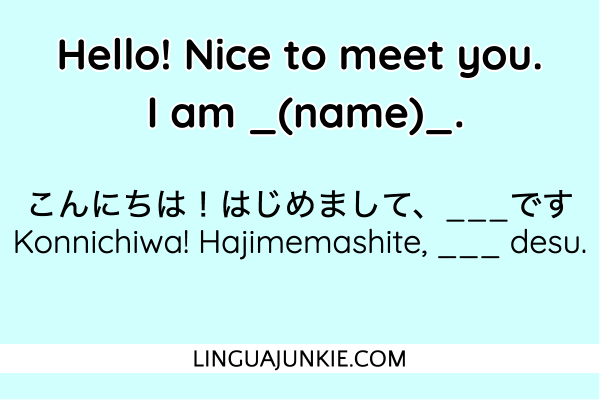
2. Asking someone if they are free to hangout
It’s also useful to learn how to ask someone when you can next meet.
Let’s look at this simple Japanese conversation. Here is how you can ask your friend about their schedule.
- Aki: I’d like to see you again. When are you free?
- また、会いたいです。いつ空いてますか
- Mata aitai desu. Itsu aitemasuka
- Tomo: I’m pretty busy this week. How about next Monday?
- 今週は、結構忙しいです。来週の月曜日は、どうですか。
- Konshuu wa kekkou isogashii desu. Raishuu no getsuyoubi wa doudesuka
- Aki: I’m not free next week. Just let me know when you are free next month.
- 来週は、空いていません。来月に空いたら教えてください。
- Raishuu wa aitemasen. Raigetsu ni aitara oshiete kudasai
- Tomo: Sure, I’ll send you an e-mail. See you soon!
- もちろん。メールを送ります。では、また会いましょう!
- Mochiron. Meeru wo okurimasu. Dewa mata aimashou
Let’s take a look at some words from this simple Japanese conversation:
- Mata – again
- Aitai – want to meet (when you conjugate a verb with “tai” it becomes “want to…”)
- Itsu – when?
- Konshuu – this week
- Isogashii – busy
- Getsuyoubi – Monday
- Raishuu – next week
- Raigetsu – next month
- Mochiron – Sure/Of course
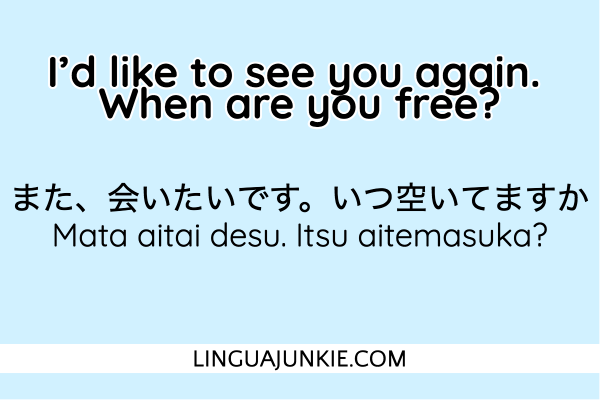
3. Ask someone their age
It may be a touchy subject for some, but sometimes it’s necessary to ask someone their age.
You can also learn ways to say it in the most polite way possible.
- Aki: Tomo, it looks like our hobbies are very similar. If you don’t mind me asking, how old are you?
- トモさん、私たちの趣味がとても似ているようですね。もし、差し支えなければ、いくつですか。
- Tomo san watashitachi no shumi ga totemo niteiruyoudesune. Moshi sashisasae nakereba ikutsu desuka
- Tomo: I am 35 years old. How about you?
- 私は、35歳です。アキさんは、いくつですか。
- Watashi wa san juu go sai desu. Aki san wa ikutsu desuka
- Aki: I’m 35, too! Wow! So we are from the same generation!
- 私も35歳です。すごい!一緒の世代なんですね!
- Watashi mo san juu go sai desu. Sugoi! Issho no sedai nandesune!
Remember. Asking “ikutsu desu ka?” is a very polite way of asking for the age. You will hear this often. But, you will also hear “nansai desu ka” which is more casual and literally means “what age?”
To talk about your age in Japanese, you’ll need to how to count in Japanese and Japanese numbers.
4. Ask someone if they speak English
If you want to take your simple Japanese conversation further, you might want to speak in English.
It doesn’t hurt to ask if they speak English!
- Aki: If it’s okay with you, can I speak in English?
- もしよろしければ、英語で話してもいいですか。
- Moshi yoroshikereba eigo de hanashitemo iidesuka
- Tomo: Sure, no problem. I need to practice my English, too. How long have you been studying English for?
- もちろん、問題ありません。私も英語を練習しなければいけません。英語は、どれくらい長く勉強してますか。
- Mochiron mondai arimasen. Watashi mo eigo wo renshuu shinakereba ikemasen. Eigo wa doregurai nagaku bennkyou shitemasuka
- Aki: I’ve been studying English for about 2 years now. But it is still hard for me to converse.
- 英語は、2年ぐらい勉強しています。でも、まだ話すのが大変です。
- Eigo wa ni nen gurai benykou shiteimasu. Demo mada hanasu no ga taihen desu
Words:
- Eigo – English
- Mondai – Problem
- Hanasu – to speak (verb)
- Benkyou – study
- Demo – but
- Taihen – tough
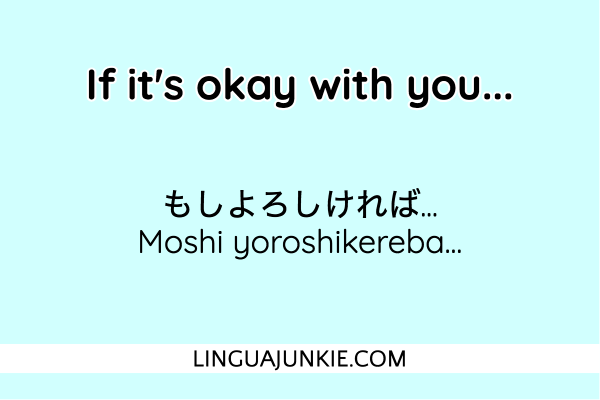
5. Ask for directions
Ahh, this is one of the most useful phrases anywhere you go. So, don’t forget to remember it.
Your Japanese conversation can go like this:
- Aki: Excuse Me. Do you have a moment?
- すいません。ちょっと時間ありますか。
- Suimasen. Chotto jikan arimasuka.
- Tomo: Yes, sure what’s up? Are you lost?
- はい、いいですよ。迷っているのですか。
- Hai, iidesuyo. Mayotteiruno desuka
- Aki: Yes, I am lost. Can you tell me where Takashimaya is?
- はい、ちょっと迷っています。タカシマヤがどこにあるか、教えてもらえますか。
- Hai, chotto mayotteimasu. Takashimaya ga doko ni aruka oshiete moraemasuka
- Tomo: If you go straight here, you can turn right at the first stoplight. Then, you will see it on your left side.
- ここをまっすぐ行くと、最初の信号で右に曲がってください。左側にあります。
- Koko wo massugu iku to saisho no shingou de migi ni magattekudasai. Hidari gawa ni arimasu
Some words from this simple Japanese conversation:
- Suimasen – casual way of saying “excuse me”
- the proper way, with proper spelling and all, is sumimasen
- Chotto – a little
- Jikan – Time
- ii – good
- Doko – where
- Massugu – straight
- Saisho – first
- Shingou – stop light
- Migi – right
- Hidari – Left
Now, what’s the BEST way to master these basic Japanese conversations?
- Print this page out.
- Put it in your notebook.
- And, every now and then read through it.
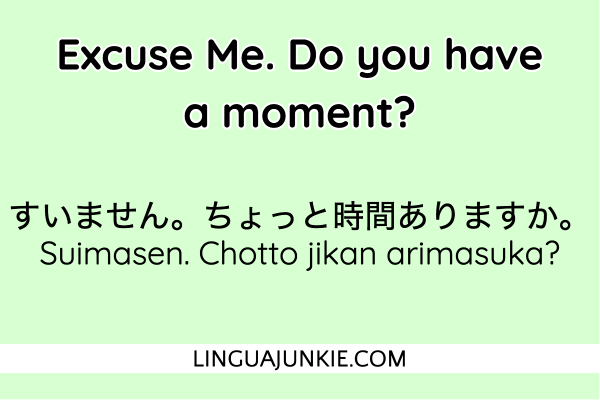
Here are some more Japanese conversation script and dialogues.
6. Talking about your routine in Japanese
This Japanese conversation dialogue is about a gym-going Jon and his coworker, Tanaka. Basically, they’re just talking about a daily routine.
But, here, the Japanese comes first and the translations come after. Cool?
- Tanaka: ジョンさん、いつもいっぱい食べますね。
- Jon-san, itsumo ippai tabemasune.
- Jon, you always eat a lot, huh.
- Jon: 毎日、午前中、おなかがペコペコです。
- Mainichi, gozenchuu, onaka ga pekopekodesu.
- I get hungry every day in the morning.
- Tanaka: 朝ごはんは、毎日食べますか。
- Asagohan wa, mainichi tabemasu ka?
- Do you eat breakfast everyday?
- Jon: はい、食べます。そして、ジムに行きます。それから、会社に行きます。
- Hai, tabemasu. Soshite, jimu ni ikimasu. Sorekara, kaisha ni ikimasu.
- Yes, I do eat. I also go to the gym. After that, I go to work (company).
- Tanaka: へぇ、毎日ですか。すごいですね。
- Hee, mainichi desu ka? Sugoi desu ne.
- Wow, every day? That’s incredible.
- Jon: たなかさんは、うんどうしますか。
- Tanakasan wa, undou shimasuka?
- What about you, Tanaka? Do you work out?
- Tanaka: わたしは、ときどき、プールに行きます。
- Watashi wa tokidoki puur ni ikimasu.
- I go to the pool sometimes.
7. Students Getting to Know Each Other
This is a fairly common Japanese conversation script and similar to what you’ve learned with introducing yourself. Take a look.
- Student 1: 学生ですか。
- Gakusei desu ka?
- Are you a student?
- Student 2: はい。月大学(つきだいがく)の留学生です。
- Hai, tsuki daigaku no ryuugakusei desu.
- Yes, I’m a study abroad student at “tsuki” university.
- Student 1: うそ?月大(つきだい)?私も 月大(つきだい)の 学生です。
- Uso? Tsukidai? Watashi mo tsukidai no gakusei desu.
- No way! Tsuki? I’m also a student at Tsuki University.
- Student 2: 本当?何年生ですか。
- Hontou? Nannensei desu ka?
- Really? What year are you?
- Student 1: 二年生です。専攻は英語学です。
- I’m a sophmore (lit. 2nd year). My major is English.
8. Drinking in Japanese
This next Japanese conversation dialogue is about getting “smashed” in Japanese. Well, just about buying drinks.
- A: まさとさんは、なにをのみますか。ワインですか?ビールですか。
- Masato san wa, nani wo nomimasu ka? Wain desuka? Biiru desu ka?
- Masato, what will you drink? Wine? Beer?
- Masato: ぼくは、ビールをのみます。
- Boku wa biiru wo nomimasu.
- I’ll drink beer.
- A: じゃ、ビールをかいます。かおりさんは?かおりさんもビールをのみますか?
- Ja, biiru wo kaimasu. Kaori san wa? Kaori san mo biiru wo nomimasu ka?
- Ok, I’ll buy beer. Kaori? Kaori will you drink beer too?
- Kaori: ええ。ちょっと
- Ee, chotto.
- Yeah, a little.
9. Asking about things in Japanese
If you want to know how to ask about things, this Japanese conversation script helps.
- Masato: これはなんですか?
- Kore wa nan desu ka?
- What is it?
- Bob: それはミートローフです。
- Sore wa meetoroofu desu.
- That is meatloaf.
- Masato: ミートローフ・・・?
- Meetoroofu…..?
- Bob: はい。にくです。
- Hai. Niku desu.
- Yes. It’s meat.
10. Where you are from.
This last Japanese conversation script deals with origins. And it’s good to know. Talking about where you’re from in Japanese is very common topic if you’re a foreigner in Japan.
- Masato: 出身はどこですか。
- Shusshin wa doko desu ka?
- Where are you from? (Lit: Where’s your hometown)
- Bob: アメリカです。
- Amerika desu.
- I’m from America.
- Benito: メキシコです。
- Mekishiko desu.
- I’m from Mexico.
- Bonjour: フランスです。
- Furansu desu.
- I’m from France.
- Bo: ベトナムです。
- Betonamu desu.
- I’m from Vietnam.
How to do Japanese Conversation Practice
Now that you have 10 Japanese conversation scripts, what’s next?
How can you get some good Japanese conversation practice from this?
1) Read out loud and 2) try and speed up your reading. Why?
The faster you can read, the better you’ll get at reading and speaking in general.
Speaking fast Japanese is a sign of expertise. When native speakers notice this, they’ll understand that you’re good “enough” and don’t need to stop and think of every word.
3) Review these Japanese conversations as much as possible. Nobody masters things on the first try. If you want these to be in your head, you need to review them for a few minutes per day.
4) Print this page out. That will make the reviewing easier. And if you want, you can also get the Japanese conversation PDF for practice. Click on the image below to get the PDF.
Japanese Conversation Topics
What are some popular things to talk about in Japanese?
What are good Japanese conversation topics. Well, let’s say you introduced yourself and know about the other person. What then?
List of Japanese conversation topics to talk about:
- Weather (it’s always good to know Japanese weather words)
- The difference between Japan and your country
- Things you like about Japanese culture
- Where you’re from in Japanese (natives will always ask you)
- Ask about their “type” and love life
- Music
- Hobbies
- Recent News
In other words, everything that you already talk about in your language.
– The Main Junkie
 | Want FREE Japanese Grammar & Vocab Cheat Sheets? Click Here to Get 20+ Cheat Sheets from JapanesePod101 (a Japanese learning program.) |

Japanese phrases does all learning to fluent spoken their Japanese descents is here you can learn the basic greetings used in Japan,more casual greeting,but use the full phrase to greet those outside of Japanese;Words of Japanese origin have entered many languages. Some words are simple transliterations of Japanese language words for concepts inherent to basic phrases.And if you’are still learning how to speak Japanese, it may seem intimidating or even impossible to reach out to new people.One of the best ways to learn the Japanese language and culture is to make Japanese friends.And again, if you want to be very… Read more »